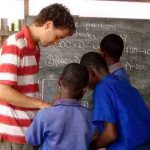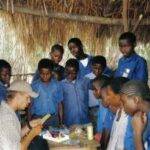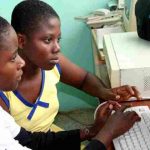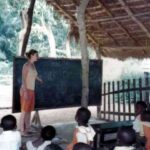- The program
- The schools
- The accommodations
- The feeding
- Entertainment and sight-seeing
- Volunteers’ safety
- Minimum qualification required
- Rough estimate of total cost involved
- Apply for this program
- Next steps — after you have been accepted
- Other relevant facts about the program
- Sign up for our Newsletter
- Submit a question
The program
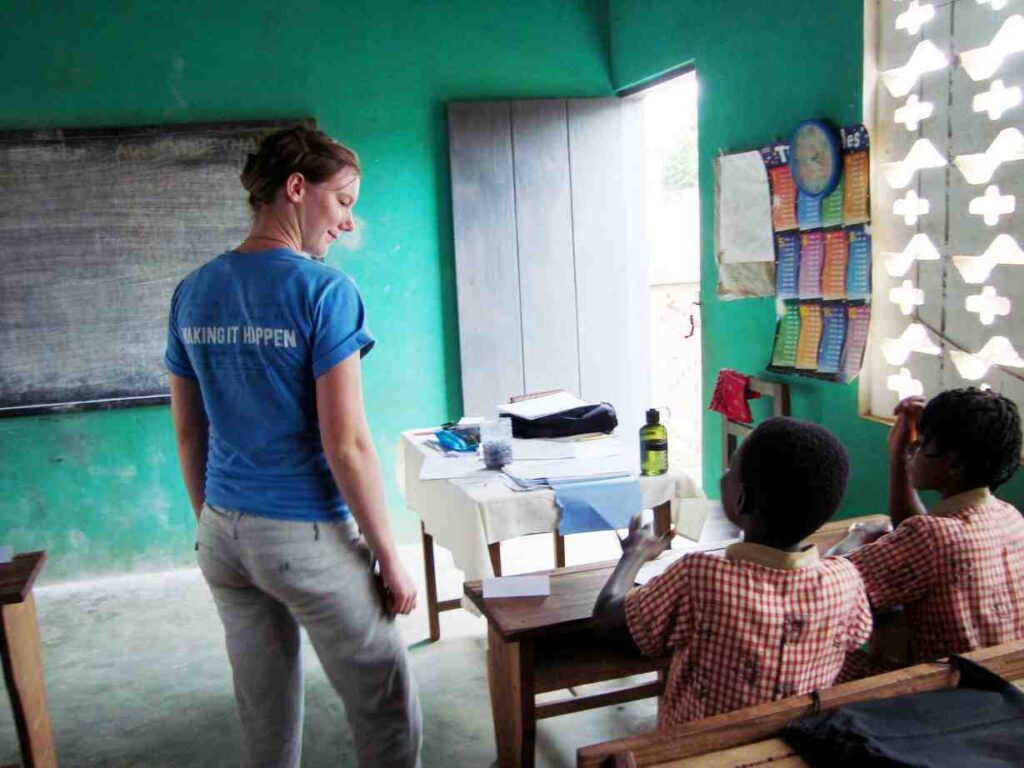
This program is designed for volunteers to teach English as a second language to Ghanaian school children in Primary (Elementary) as well as Junior High schools.
You can choose to teach the language to any one (or more) of eight different classes (or ages). The broad aim of the syllabus is to help the pupil develop the basic language skills of listening, speaking, reading and writing. Back to top
- Primary class 1 (mean age of 6 years). Read excerpts of the curriculum
- Primary class 2 (mean age of 7 years). Read excerpts of the curriculum
- Primary class 3 (mean age of 8 years). Read excerpts of the curriculum
- Primary class 4 (mean age of 9 years). Read excerpts of the curriculum
- Primary class 5 (mean age of 10 years). Read excerpts of the curriculum
- Primary class 6 (mean age of 11 years). Read excerpts of the curriculum
- Junior High 1 (mean age of 12 years). Read excerpts of the curriculum
- Junior High 1 (mean age of 13 years). Read excerpts of the curriculum
PRIMARY 1 ENGLISH – Curriculum excerpts
Listening, Reciting and Singing, Story-telling, Conversation, Drama, Nouns, Verbs, Command / Request sentences, Simple Prepositions (in, on, under, behind), Questions and Responses (what, where, who), Personal Pronouns (I, you, he, she, we, they), Demonstratives (this, that, these, those)… (A more detailed curriculum will be provided to you — after you have applied and confirmed your participation in the program) Top
PRIMARY 2 ENGLISH – Curriculum excerpts
Singing songs, Reciting rhymes and poems, Listening, Conversation, Nouns, Verbs, Questions and responses (do, be, have), Present Continuous, Simple Past, More Prepositions (up, down, into, in, in front of), Recognition of words, Phonic work, Recognition of sounds in known words — vowels, Sound discrimination, Supplying missing letters and words… (A more detailed curriculum will be provided to you — after you have applied and confirmed your participation in the program) Top
PRIMARY 3 ENGLISH – Curriculum excerpts
Story-telling, Conversation, Drama, Subject-Verb agreement, Simple Past, Past Continuous, Prepositions (below, above, in front of, behind, near), Expressing the future, Reading aloud, Reading games, Silent reading, Phonic work, Penmanship and copy work, Purposeful copying of sentences, Punctuation (full stop and comma)… (A more detailed curriculum will be provided to you — after you have applied and confirmed your participation in the program) Top
PRIMARY 4 ENGLISH – Curriculum excerpts
Listening to instructions / directions and carrying them out, Listening to songs, poems and rhymes, Story-telling. Conversation, Drama, Polite request, Proper and common nouns, Comparison of adjectives, Verb tense forms: Simple past, Present perfect, Adverbs, Reading aloud, Silent reading… (A more detailed curriculum will be provided to you — after you have applied and confirmed your participation in the program) Top
PRIMARY 5 ENGLISH – Curriculum excerpts
Listening to songs, poems and rhymes, Listening to instructions / directions and carrying them out, Story-telling. Conversation, Drama, Count nouns and Non-count nouns, Comparison of adjectives (Irregular), Simple Determiners (a, an, the, each, both, all) Quantifiers: (many, more, much), Penmanship: joint script, Summary writing… (A more detailed curriculum will be provided to you — after you have applied and confirmed your participation in the program) Top
PRIMARY 6 ENGLISH – Curriculum excerpts
Listening to poems / rhymes, Listening to instructions / directions, Story-telling, Conversation, Drama, Anomalous finites (Modals: must, have to, should, ought to need to), Adverbs of more than one word, Prepositions, Adjectives, Direct and reported speech, More about quantifiers (some, any, few, a few, little, a little, many, much, both, all, a majority, the majority), Idioms and idiomatic expressions… (A more detailed curriculum will be provided to you — after you have applied and confirmed your participation in the program) Top
JUNIOR HIGH 1 ENGLISH – Curriculum excerpts
Pure Vowel sounds, Consonants, Diphthongs, Conversation, Proper nouns, Common nouns, Irregular nouns, Pronouns and their types, The simple sentence: subject, predicate, Subject-Verb agreement, Transitive and intransitive verbs, Active and passive sentences, Adverbs, Reading comprehension… (A more detailed curriculum will be provided to you — after you have applied and confirmed your participation in the program) Top
JUNIOR HIGH 2 ENGLISH – Curriculum excerpts
Vowels and consonants, Intonation, The syllable and word stress, Conversation, Auxiliary verbs, Modals, Phrases, Clauses, Verb tense forms, Compound sentences, Conditional sentences, Complex sentences, Complex prepositions, Possessive and reflexive pronouns, Comprehension, Summary writing, Punctuation marks, Writing dialogues, Filling in forms… (A more detailed curriculum will be provided to you — after you have applied and confirmed your participation in the program) Top
The schools
VIGS GHANA partner schools are located in many villages, towns and cities in the coastal belt. From Sega in the east through Prampram, Aburi, Tema, Bawjiasi, Accra and all the way to Twifu-Mampong and Takoradi in the west. We also have partner schools in the middle parts of Ghana (Kumasi).
Back to top
The accommodations
Most of the accommodation is with carefully-selected host-families, with a couple of dedicated volunteers’ apartments. You would be placed in the same home with another volunteer — except you specifically state that you prefer to be placed alone. Volunteers coming as a pair or couple will not be placed with other volunteers in the same bedroom. Volunteer(s) have their separate room – with a lock and key. There are two beds in the volunteers’ room; each with a mattress and in most cases a table and chair. It is advisable to bring along a mosquito net and a spare bed sheet. Many homes have a shower and flush toilet. In others you would have to manage with a bucket of water and a pit toilet – more likely in smaller towns and villages. Laundry is usually done with a couple of buckets. Back to top
The feeding
You will be served three meals daily. Breakfast is usually tea/ coffee/ oats or corn porridge and bread with jam/ butter/ egg omelet. Lunch could be plantain or rice or yam with vegetable stew or similar. Dinner could be rice, yam, pasta or plantain with vegetable sauce or stew or soup. For dessert you’d be served an orange or pineapple. Back to top
Entertainment and sight-seeing
Weekends are free days. You may choose to travel out of town to see the many interesting sights and sounds in other parts of Ghana or hang out with your fellow volunteer(s) and/or locals in the neighbourhood. VIGS-GHANA frequently puts together sight-seeing trips: as a volunteer on one of our programs, you’ll first be given the option to sign-on to our tours. The remaining slots will be offered to the general public. Back to top
Volunteers’ safety
Your safety is of paramount importance to VIGS GHANA. As such we give you all the relevant safety tips, plus we place you only in places where good medical services are within easy reach. In addition, we’ll give you a smart phone – so you can call or text or email or Whatsapp the in-country supervisors whenever the need arises. Our in-country support staff are on call 24 hours a day, 7 days a week. Back to top
Minimum qualification required of volunteers for the program: Applicants for this program must have at least completed high school.
Back to top
Rough estimate of total cost involved
- Flight to and from Ghana: US$600-1250 (Round-trip)
- Ghana visa: US$80-170
- Vaccinations: US$150-250
- Travel Insurance: US$70-320
- Miscellaneous personal items: US$300-900
- Personal Spending money whilst in Ghana: US$200 upwards
- VIGS GHANA Program fee: starts from US$450
So, a rough estimate of the total cost for a two-week program duration would be about US$1,870 – 3,560. Check the equivalent in your currency. Back to top
Next steps — after you have been accepted and given your Placement information
After you have been admitted to participate in the program, you would now have to execute the following:
- Book a flight. See our flight information page. The earlier you book and confirm your flight, the better.
- Go through the suggested checklist of things to do and bring and start getting (or packing) them
- Send us your flight itinerary
- 60-30 days before your departure date, you must start processing for your Ghanaian visa. VIGS GHANA will provide you with the needed references in Ghana — which are needed to obtain a Ghanaian visa. Back to top
Other relevant facts about the program
- Minimum volunteering/internship duration: 1 week.
- Maximum duration: 6 months.
- Age range accepted: 18 – 75 years.
- We will send you a document on how to fund-raise for your trip – after you’ve confirmed your participation.
- We will meet you at the Airport in Accra (ACC) on your arrival day.
- We will give you a smart phone with internet and IDD (International Direct Dialing) capability on your arrival day.
- The average work day is 3-8 hours for this program.
- Saturdays and Sundays are free days.
- You can contact VIGS GHANA local staff on cell phones all the time — 24 hours a day — seven days a week.
- We can give you a Testimonial on successful completion of your volunteer or internship work.
- You can pay the program fee through any of the following methods:
- via PayPal or debit/credit cards.
- Cash installments (or full payment) upon arrival into Ghana.
